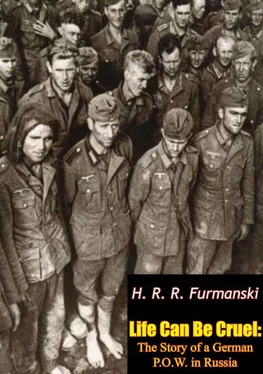The hospital was a big red stone building located a few blocks away from our home, large and well equipped as compared with other hospitals in Germany in 1918, since our town was the county seat of an important section. But it was badly understaffed, which was not unusual in that wartime year. Mother sent a nurse to find a doctor, but she wouldn’t let me be taken from her: she followed the bustling white and gray figure, still clutching her bundle. When she saw the doctor, she stopped suddenly and looked at him in astonishment: he was only a boy. In fact, she knew him to be Joseph Henze, a neighbor’s son. She laid me on the table and undid the blankets, talking while she did so, describing the course of the illness during the past two days. As she finished she straightened up, saying in a soft but firm voice, “He is very ill, Doctor, I know. But you must not let him die. He is only five years old, but he is the man of our house.”
The young doctor smiled and began his examination. His look grew suddenly grave. “Your son has diphtheria,” he said. “The diphtheria has knitted a web across his trachea—his windpipe through which he must breathe. I will tell them to prepare him for surgery. In two hours we can operate—if he is alive. If he is not, then our preparations did no harm, at any rate.”
He looked at the woman to gauge her reaction. She said nothing, only nodding in acknowledgement of his words. She didn’t cry or gasp or faint. She sat in a chair near her son’s head and began her wait.
Joseph Henze whispered his instructions to the nurse and quickly left the room to prepare himself for the operation. He might have told the woman it was too late to do anything to save her son. This would have been very close to being the truth. He had never performed the operation before, and his staff was as young and inexperienced as he. The boy might die anyway. Yes, he might. The chance of shock afterward, and the daily risks incurred during the period of the boy’s recuperation, might well kill him. Yet this woman expected him to save her son, and as long as there was a chance of his being able to do it, he must try. He would perform the operation—if the child lived through the next two hours. Suddenly he hoped—almost prayed—that the child would live so that he could prove to himself and them—the rest of the world that doubted his skill because of his youth and his idealism—that idealism was a form of determination, and that with determination he could save the boy and live up to his ideals.
For Doctor Henze the two hours passed all too quickly. For the woman in the small room each minute contained a sunrise and sunset, while the sound of the nurse’s skirts and her son’s choked breathing echoed like thunder in the walls of a canyon. She tried to quiet the tumult with her prayers, to bring peace to herself and her son. It was almost a relief when the doctor appeared, though she dreaded the surgery with a fear that was largely instinctive. The boy was still alive: they would operate. The small party moved toward the operating room. Dr. Henze explained that he was going to enter the boy’s throat and find the web. He would then place a small tube in the trachea and remove the web through suction. He would leave the tube in, through which the last vestige of the web would have to be removed until there was no longer any danger of the web reforming. If, he made it very clear, the boy survived the operation.
He assured her that he would do everything he could, but he knew that she didn’t need his assurances. They both knew that the outcome was largely in the hands of God. And they both prayed.
The operation began. Slowly, and with great concentration, the doctor worked, constantly checking the pulse and temperature of the small body beneath his hands. Slowly, and with great emotion, the words of prayer formed in the mind of the woman outside. At times the image of her son and the image of her husband seemed to blend into one image, to become one in her mind. She could not lose both. She would not lose both. Her husband would return to find his family waiting for him—his wife, his daughter, and his son. She strove mightily to convince herself of this.
The boy’s chances for survival were diminishing with the decrease of his pulse rate and the lowering of his body temperature. His heart began to falter. The sound of the straining muscle became weaker, less frequent, more strained. The doctor worked with increased concentration. The small muscle rested, and they waited silently for it to beat again, praying that it would, soundlessly urging it, willing it, to resume its normal function. The young surgeon never stopped working, his orders for instruments, his instructions to his assistants quiet and unceasing. The heart beat again, hesitantly, as if unsure of its right to function normally. The woman outside heard the heartbeat in the click of the clock that faced her; she heard it in the hollow tread of a doctor’s footstep; she heard it in the steady thump of cart wheels rolling by. She waited, listened. There were only two sounds in the world for her—the sound of that heartbeat and the sound of the prayers that formed in her mind’s voice: all others had been obliterated.
The man inside the operating room heard the heartbeat, too. He strained to catch it as he inserted the small silver tube into the boy’s trachea. It seemed to beat more loudly as he cleared the strangling web; and as he began to close the wound it seemed to fill the room with the strains of a triumphal march, a hallelujah chorus as its background. His fingers worked automatically with the bandages, his mind attuned to the lub-dub sound within the small breast, transforming it in his mind to an equally rhythmic and steady Thank God, Thank God ….
The woman outside turned suddenly in her chair; the door next to her had opened. Her maternal instinct was aroused by the sudden picture of the tired young man who slowly pulled himself out of the doorway. He walked to her slowly; she didn’t dare to ask him. He didn’t—he couldn’t—use words to tell her: he simply smiled with a tired mouth, nodded his perspiring head and told her with thankful, almost exultant eyes that they had brought it off. The boy was alive; he had survived the operation, and at the moment that was all that mattered.
For two days I lay in a comatose state, not moving when they removed the small tube each morning, afternoon, and night to clean it. I slept, not knowing that I was constantly being watched for signs of shock, for difficulty in breathing or for signs of awakening. On the third day I awoke for short periods of time. I tried to move, but found I could not. I tried to speak, to tell Mother that I was glad she was there, wherever we were, because I felt so funny all over. Then I would fall back into my half-drugged sleep.
Mother, in order to be with me, left the shop with almost no supervision for nearly four days, the books becoming hopelessly confused, the stock in need of replenishing, and the kitchen in a muddle. It had been difficult enough having to be in two different places before the operation; now she had to make her presence felt in three different buildings, all demanding her concern, concentration, and constant supervision.
It was on the third day after the operation, as she sat tiredly and heavily in the chair beside the hospital bed, that I awoke from a deep slumber. The young doctor stood beside her, as he did each day until it was time for her to leave. They spoke little; just the amenities passed between my worried mother and the young physician.
Today, when I awoke, they were in their places, and they began to move simultaneously as I opened my eyes and showed signs of being fully awake. My mother took my hand and spoke to me as the doctor stood behind me and deftly moved his fingers over the bandage. He smiled as my eyes met his, then introduced himself. As simply as possible he explained to me what had happened; then he told both of us what he was going to do. The tube would be removed for cleaning three times a day until they were sure that the web would not form again. The procedure would be painful, but I would get used to it after a while. The length of time until I would be able to leave the hospital would depend on my recuperative powers, my co-operation, and the will of God.
Читать дальше












